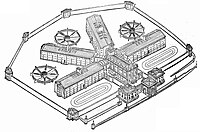Biosocial criminology

Biosocial criminology is a big and complicated word that helps people understand why some people might break the rules or do bad things.
Basically, it says that there are two important things that can make a person more likely to do bad things: their biology (which is the stuff inside their body like their genes and brain) and the environment they grow up in (which is everything around them like their family, friends, and where they live).
Biosocial criminology says that both of these things are important and work together to make someone more likely to break the rules. For example, if someone has genes that make them more impulsive and a bad home life with parents who fight a lot, that person might be more likely to get into trouble with the law.
But it's important to remember that just because someone might have things in their biology or environment that make them more likely to do bad things, it doesn't mean they will definitely do bad things. People always have choices and can choose to make good choices even if it's harder.
Basically, it says that there are two important things that can make a person more likely to do bad things: their biology (which is the stuff inside their body like their genes and brain) and the environment they grow up in (which is everything around them like their family, friends, and where they live).
Biosocial criminology says that both of these things are important and work together to make someone more likely to break the rules. For example, if someone has genes that make them more impulsive and a bad home life with parents who fight a lot, that person might be more likely to get into trouble with the law.
But it's important to remember that just because someone might have things in their biology or environment that make them more likely to do bad things, it doesn't mean they will definitely do bad things. People always have choices and can choose to make good choices even if it's harder.
Related topics others have asked about:
